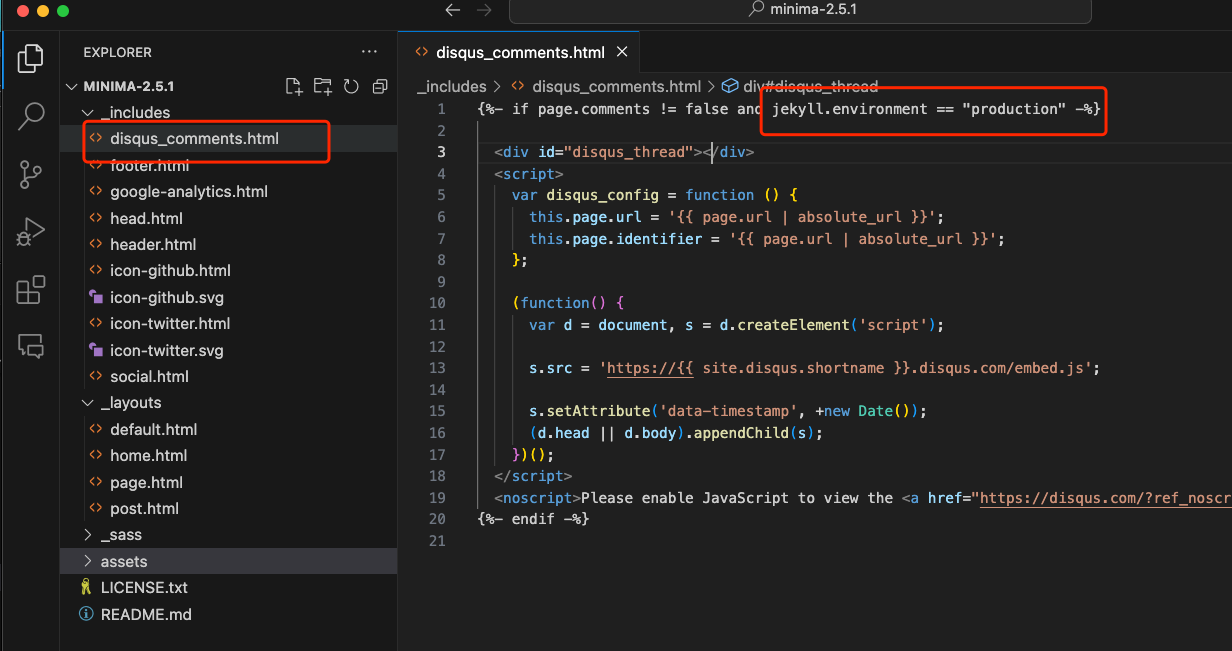在 Jekyll 中添加 Disqus
Jekyll 目录结构的变化
如果使用 Jekyll disqus 或 Octorpess 作为关键字 google, 得到的结果多数是先引导你在 _includes/* 文件夹下添加一个 disqusXXX.html文件. 然后当我们浏览 Jekyll 根目录的事后, 却发现找不到 _include 文件夹…
这是因为从 Jekyll 使用 gem 来管理主题后, 项目目录结构就发生了一些变动.
Jekyll 3.2 以前(不支持 gem theme 的版本)的项目目录结构.
1
2
3
4
5
6
7
8
9
10
11
12
13
14
15
16
17
18
19
20
21
22
23
24
25
.
├── _config.yml
├── _data
│ └── members.yml
├── _drafts
│ ├── begin-with-the-crazy-ideas.md
│ └── on-simplicity-in-technology.md
├── _includes
│ ├── footer.html
│ └── header.html
├── _layouts
│ ├── default.html
│ └── post.html
├── _posts
│ ├── 2007-10-29-your-posts.md
├── _sass
│ ├── _base.scss
│ └── _layout.scss
├── _site
├── .jekyll-cache
│ └── Jekyll
│ └── Cache
│ └── [...]
├── .jekyll-metadata
└── index.html # can also be an 'index.md' with valid front matter
Jekyll 3.2 以后,因为 Jekyll theme 采用 gem 来管理, 所以 _includes, _layouts 以及 _sass等文件夹,都被移到了 theme gem 项目文件夹中.
1
2
3
4
5
6
7
➜ Blog git:(main) ✗ bundle info minima
* minima (2.5.1)
Summary: A beautiful, minimal theme for Jekyll.
Homepage: https://github.com/jekyll/minima
Path: /Users/<username>/.rbenv/versions/3.2.2/lib/ruby/gems/3.2.0/gems/minima-2.5.1
Reverse Dependencies:
github-pages (228) depends on minima (= 2.5.1)
根据 Path, 查看 minima 的项目文件, 可以看到 _include 文件夹中已经有添加好的 disqus_comments.html(说明该 minima 主题默认支持 disqus)
Jekyll docs 中关于这一变化的说明: https://jekyllrb.com/docs/structure/
添加 Disqus 的流程
- 去 Disqus 注册账号, 创建一个 site, 并获取 short_name
- 在
_config.yml中配置 disqus 的 short_name, 配置 url1 2 3 4 5
url: "https://douxinchun.github.io" ... # Disqus Comments disqus: shortname: springs-blog
- 在 markdown 文件中启用 comments
1 2 3 4
--- ... comments: true ---
注意事项
1.Jekyll environment 问题
在上的图中可以以看到 disqus comments 需要在 production 环境下启用.
1
- if page.comments != false and jekyll.environment == "production" -
更多关于 Jekyll environment 的介绍, 可以查看这里https://jekyllrb.com/docs/configuration/environments/
根据之前的文章 “Octopress 2.0 到 3.0 的迁移”中”部署”章节中的介绍, 我把博客文章的管理和部署分开在两个不同的仓库, 所以这里需要在部署到 github pages 服务之前, build 的时候把环境变量 JEKYLL_ENV 设置为 production, 部署结束后,在设置为原值,这样可以保留本地在development环境下部署, 服务器在production环境下部署.
我写了一个简单的脚本deploy.sh,来事项上述操作:
1
2
3
4
5
6
7
#!/bin/zsh
Original_JEKYLL_ENV=$JEKYLL_ENV
export JEKYLL_ENV=production
bundle exec jekyll build
octopress deploy
export JEKYLL_ENV=$Original_JEKYLL_ENV
2. 文章的链接问题
默认的文件链接路径中带有了 category, 由于该链接会被 disqus 作为文章评论的 key 被使用, 所以需要保持稳定性.
在 _config.yml 中配置 permalink 的样式:
1
permalink: /:year/:month/:day/:title:output_ext
Chirpy 主题可以直接使用下面的选项作为 permalink:
1
permalink: /posts/:title/

Comments powered by Disqus.